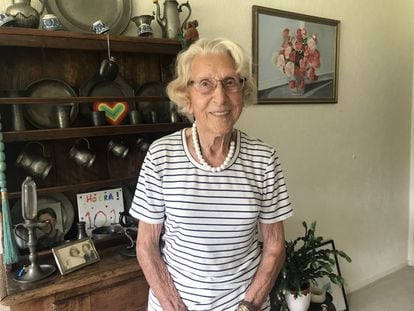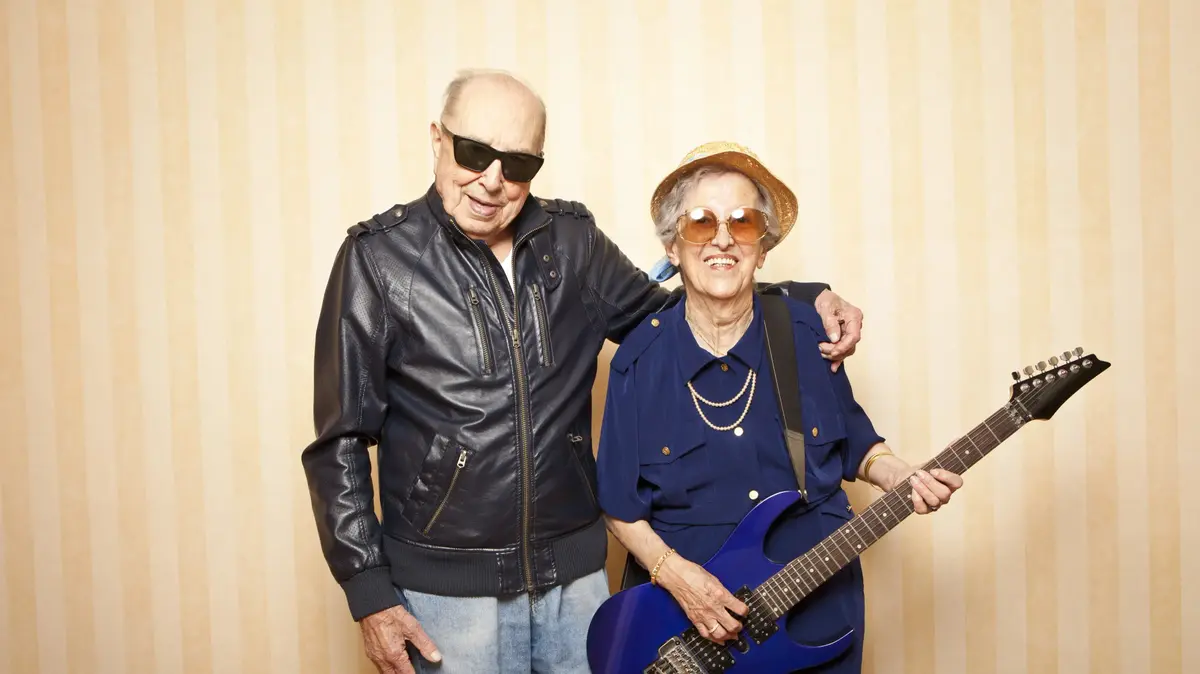Frits Brockhus, 102, at his home in Zandvoort, the Netherlands, on July 11.
The doorbell rings, and the owner of the house, Susan Hosang-Van Riemsdijk, opens the door. He resides in the city of Hilversum, in the center of the Netherlands, in a separate, ground-floor building. It is a Saturday in July, there is a light breeze, and she has planted the flowers that adorn the entrance. Nothing seems exceptional, except for the age of the hostess: 102 years. In perfect shape, she lives alone, swims, rides a bike and drives her car short distances, plays bridge, eats a balanced diet, and has a close relationship with her two daughters, six grandchildren, and 14 great-grandchildren. Centenarians are a unique population group to analyze the genetic foundations of longevity,as well as the risk factors that determine degenerative disorders and Susan is one of 332 Dutch people of this generation who participate in a study on the relationship between health and cognitive ability in old age. Led by biochemist Henne Holstege from the Amsterdam University Hospital, they have observed that the genome of this league of centenarians is enriched with protective genetic elements. Although Alzheimer's-related proteins have accumulated in their brains with age, they appear to resist the effects of these risk factors, and this research may contribute to improving treatments for patients with dementia.have observed that the genome of this league of centenarians is enriched with protective genetic elements. Although Alzheimer's-related proteins have accumulated in their brains with age, they appear to resist the effects of these risk factors, and this research may contribute to improving treatments for patients with dementia.have observed that the genome of this league of centenarians is enriched with protective genetic elements. Although Alzheimer's-related proteins have accumulated in their brains with age, they appear to resist the effects of these risk factors, and this research may contribute to improving treatments for patients with dementia.
More information
The suffocation that gives wings to Alzheimer's
According to Holstege, who has been investigating centenarians since 2013, if you reach that age “the possibility of developing dementia is greater than that of dying, so that once a century is over, no one should be left healthy from the point of view cognitive". He adds that there are people who preserve cognitive health even past 110 years -the so-called supercentennials- and he is interested in knowing “how it is scientifically possible to complete a century with good cognitive capacity, what are the molecular mechanisms that maintain mental health in the long term , and what role does inheritance play ", he asserts in a telephone conversation. To achieve this, his team has visited the members of the study group annually since 2013, with an average age of 100 and a half years, to measure their attention, perception, understanding or memory.They also ask for stool samples, the latter to analyze the microbiota. 75% are women and more than half live independently in residences. The experts have also sequenced his genome, and compared it with the DNA of other people suffering from dementia in collaboration with the Center for Alzheimer's in Amsterdam. They aspire with this to trace the protective genetic variants enriched in healthy centenarians, and that distinguish them from the rest of the population.They aspire with this to trace the protective genetic variants enriched in healthy centenarians, and that distinguish them from the rest of the population.They aspire with this to trace the protective genetic variants enriched in healthy centenarians, and that distinguish them from the rest of the population.
The genome is one of the tools to understand what goes wrong in a brain with dementia "because between 60% and 80% of the possibility of having it, or of suffering from Alzheimer's, which is the prevalent form, is defined by genetic factors
Holstege indicates that the genome is one of the tools to understand what goes wrong in a brain with dementia "because between 60% and 80% of the possibility of having it, or of suffering from Alzheimer's, which is the prevalent form, is defined due to genetic factors ”. And he adds: “We see that the centenarians have maintained the efficacy of the immune response - in the study group some have overcome cancer or the coronavirus - and it is a question of how they have resisted the decline in defenses against diseases to protect in this way to those who are at risk of mental deterioration ”. 30% of the study group agrees to donate their brain to science when the time comes.
The long life of a Dutch woman, Hendrikje van Andel-Schipper, who died in 2005 at the age of 115 with full lucidity, was what led biochemistry to take an interest in these elders. The Netherlands does not appear on the list of the so-called Blue Zones of the world where there are people who are above the average age of their environment - there are Japan, Greece, Costa Rica, California and Italy - but it has a striking number of centenarians in good shape . In 2020, there were 2,006 women and 392 men, aged 100 or over, in a population of 17 million, according to the Central Statistical Office. By 2029, the same source expects there to be about 3,400 centenarians "due to a small
baby boom
after World War I."
Susan Hosang-Van Riemsdijk, 102, at her residence in Hilversum, central Netherlands. IF
Susan Hosang-Van Riemsdijk was born in 1919 and her daughters are 74 and 70 years old, respectively. In the photos that adorn their living room they both look much younger. Her husband, however, who was an electronics engineer, passed away at the age of 67. “Very young, a shame; He was a smoker ”, she says, to later relate a chapter from her youth that summarizes her physical strength and the hardships of the Nazi occupation of the country throughout World War II. With her husband hiding "in the gap between the dining room and the kitchen so that he would not be taken to do forced labor in Germany," Susan went to look for food on a bicycle with wood-reinforced wheels and a car tire. “He was heavy, but he traveled 145 kilometers one way, and as many back, in search of food on a farm located in the east of the country.There were more people doing the same, and the farmers did not want money or jewelry. They only asked for clothes, and the first time I came back dressed in pajamas that were the only thing I had left, ”she recalls. At the beginning of her marriage she did not work, “that's the way things were”, but between her 50 and 80 years she dedicated herself to pedicure, aesthetics and Japanese shiatsu massages, for which she obtained the corresponding diplomas.
Another participant in the investigation is Frits Brockhus, also 102, who lives in the western city of Zandvoort, famous for its Formula 1 circuit. He was a police investigator for three decades. Agile and jovial, his garden fills with sparrows during the chat. "I usually have breakfast outside and they perch on my knees waiting for a crumb," he says. He takes care of his sight and hearing, he likes meat and herring and he has some wine, he has barely smoked, he reads the British writer John Le Carré in English and listens to classical music. And he has done a lot of exercise. “I have practiced soccer and badminton, hiking and swimming, and I have used the bike to a great extent,” he explains, to later show the latest generation tricycle with which he visits his daughter, 64, son-in-law and two granddaughters, to whom is very close.His portraits decorate the living room and he shows them delighted. It is 14 kilometers between going and back to the daughter's house, and two years ago I could do up to 80 kilometers. Although he has also fallen: once in a game of badminton, when he was 80 years old, and he broke his femur. At 92, a dog threw him off his bike and he spent two months resting with a broken pelvis.
Susan's mother reached 95 years old. Frits is the seventh of ten siblings, and two of his sisters turned 102, a third 103 and another 98. The two remaining siblings are 98 and 95 years old, respectively. Another one died at age 52, "from smoking," he says. He describes their marriage as very happy, and is moved to remember that they lost a daughter at 17, to a brain tumor, and two other babies. His memory is that of the 20th century, and World War II surprised him when he was 21 years old, when he was already working in the local Dutch police. “It was a very difficult time because you never knew if the Gestapo was going to appear. Then there were the bombings, or when a plane was shot down and no one came out alive. Terrible, ”he remembers. Without knowing each other, both centenarians agree that "physical exercise helps you age in better conditions."According to Henne Holstege, "the better they are cognitively, the longer they live and we see that their children benefit from the hereditary factor", and he has proposed to learn from them.
You can follow MATERIA on
,
and
, or sign up here to receive
our weekly newsletter
.









